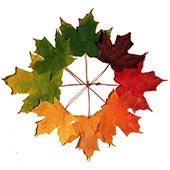 |
Family Ulmaceae – Zelkova, Hackberry, Elm Trees Main | Trees Index | Elm Index The Morton Arboretum has one of the largest living Ulmus collections in the world. |
Custom Search
|
American Elms show prototypical vase shape of the Ulmus genus. Once a very popular and long-lived (300+ years) shade and street tree, American elm was decimated in the mid-20th century by "Dutch" elm disease, a fungus spread by a bark beetle. The wood of American Elm is very hard and was a valuable timber tree used for lumber, furniture and veneer. The Indians once made canoes out of American Elm trunks, and early settlers would steam the wood so it could be bent to make barrels and wheel hoops. It was also used for the rockers on rocking chairs.
The Morton Arboretum, at Lisle, Illinois, where these pictures were taken, is home to the largest Elm collection in North America. Under study, the collection includes almost all of the 22 Elm species native to China, a dozen of which show resistance to Dutch elm disease and elm yellows. The Arboretum in past years has bred and marketed five new elm varieties resistant to Dutch elm disease. The 12 species being studied are: the Bergmann (Ulmus bergmanniana), Taihang Mountain (U. taihangshanensis), Tibetan (U. microcarpa), Anhui (U. gaussenii), Hebei (U. lamellosa), Harbin (U. harbinensis), corkbark (U. propinqua var. suberosa), plum-leaved (U. prunifolia), Chenmou (Ulmus chenmoui), Gansu (Ulmus glaucescens var. lasiocarpa), chestnut-leaved (U. castaneifolia) and Father David (U. davidiana var. mandshurica) elms. These 12 Chinese trees are virtually unknown in the U.S., but are under close study at the arboretum. Dendrologist Emeritus and former research director Dr. George Ware, and Arboretum Assistant Director of Collections Kunso Kim are responsible for their observation and data collection. Their efforts may help ameliorate the effects of numerous maladies affecting trees around the world, such as Emerald Ash Borer, Oak wilt, Asian Longhorned Beetle, Pine Sawyer Beetle, et al. "These and other problems underscore the urgent need for the Arboretum and others to continue seeking new species for urban use," Kim says. The average lifespan of an urban tree is fewer than 10 years, according to Ware. But planting hardier trees increases the likelihood of a longer life and a greener world – a goal that has never been more important than now, with climate change upon us. [2] |
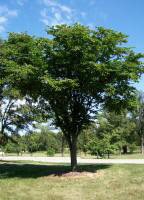 Nikko Elm |
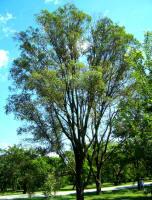 Siberian Elm |
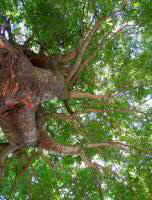 Japanese Zelkova |
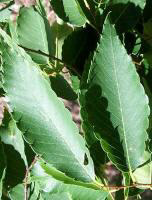 Zelkova 'Green Vase' |
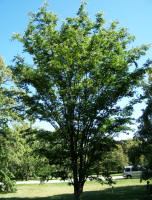 Zelkova 'Village Green' |
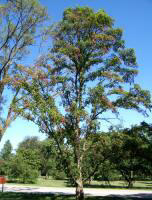 Japanese Elm |
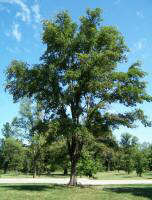 David Elm |
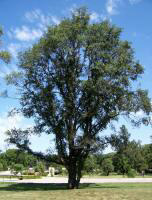 English Elm |
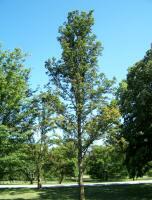 Smooth-leaved Elm |
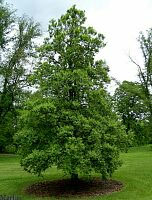 Cedar Elm |
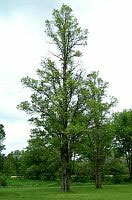 Jersey Elm |
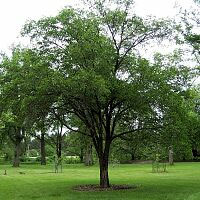 Large-fruited Elm |
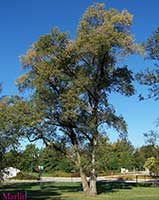 Dropmore Siberian Elm |
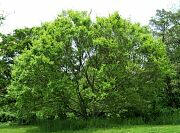 Chinese Elm |
Hybrid Elm |
 Corkbark Elm |
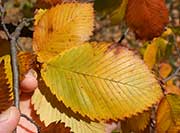 Rock Elm |
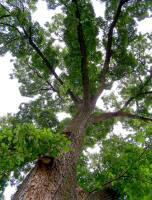 Accolade Elm |
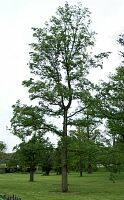 Klemmer Holland Elm |
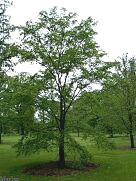 Bergmann's Elm |
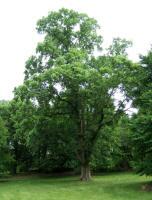 Russian Elm |
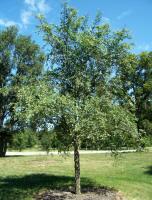 Chenmou Elm |
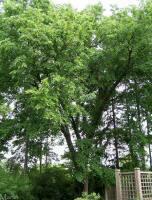 American Elm |
Hobei Elm |
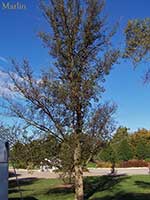 Holland Elm |
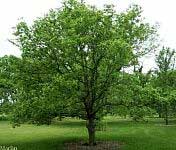 Hackberry |
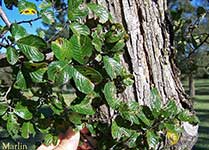 Triumph Elm |
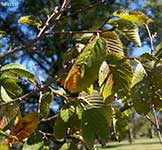 Scotch Elm, Wych Elm |
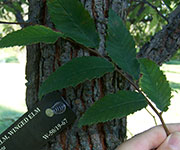 Winged Elm |
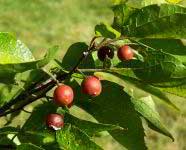 Sugarberry Celtis laevigata |
Commendationâ„¢ Elm Ulmus 'Morton Stalwart' |
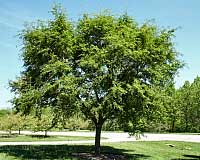 Vanguardâ„¢ Elm Ulmus 'Morton Plainsman' |
References
|
| Tree Encyclopedia / North American Insects & Spiders is dedicated to providing scientific and educational resources for our users through use of large images and macro photographs of flora and fauna. |
 |
Family Ulmaceae – Zelkovas, Hackberries and Elms
There are about 200 species of trees and shrubs in Ulmaceae. Elms fell victim to Dutch Elm disease during the 1950s; until that time, they were the premier shade tree along the streets of our American towns and cities. The Morton Arboretum in past years has bred and marketed five new elm varieties resistant to Dutch elm disease. Insects & Spiders Home | Elm Index | Tree Encyclopedia | Trees Index |
